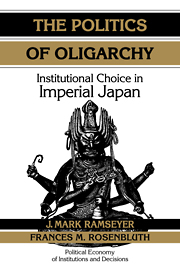Book contents
- Frontmatter
- Contents
- List of tables and figure
- Series editors' preface
- Acknowledgments
- CHAPTER 1 INTRODUCTION
- CHAPTER 2 THE COLLAPSE OF OLIGARCHY: FAILED ATTEMPTS AT CARTEL-MAINTENANCE
- CHAPTER 3 CONCESSION OR FACADE: THE MEIJI CONSTITUTION
- CHAPTER 4 ELECTORAL RULES AND PARTY COMPETITION: THE STRUGGLE FOR POLITICAL SURVIVAL
- CHAPTER 5 THE BUREAUCRACY: WHO RULED WHOM?
- CHAPTER 6 THE COURTS: WHO MONITORED WHOM?
- CHAPTER 7 THE MILITARY: MASTER OF ITS OWN FATE
- CHAPTER 8 FINANCIAL POLITICS
- CHAPTER 9 RAILROAD POLITICS
- CHAPTER 10 COTTON POLITICS
- CHAPTER 11 CONCLUSION: INSTITUTIONS AND POLITICAL CONTROL
- Notes
- References
- Index
CHAPTER 5 - THE BUREAUCRACY: WHO RULED WHOM?
Published online by Cambridge University Press: 05 June 2012
- Frontmatter
- Contents
- List of tables and figure
- Series editors' preface
- Acknowledgments
- CHAPTER 1 INTRODUCTION
- CHAPTER 2 THE COLLAPSE OF OLIGARCHY: FAILED ATTEMPTS AT CARTEL-MAINTENANCE
- CHAPTER 3 CONCESSION OR FACADE: THE MEIJI CONSTITUTION
- CHAPTER 4 ELECTORAL RULES AND PARTY COMPETITION: THE STRUGGLE FOR POLITICAL SURVIVAL
- CHAPTER 5 THE BUREAUCRACY: WHO RULED WHOM?
- CHAPTER 6 THE COURTS: WHO MONITORED WHOM?
- CHAPTER 7 THE MILITARY: MASTER OF ITS OWN FATE
- CHAPTER 8 FINANCIAL POLITICS
- CHAPTER 9 RAILROAD POLITICS
- CHAPTER 10 COTTON POLITICS
- CHAPTER 11 CONCLUSION: INSTITUTIONS AND POLITICAL CONTROL
- Notes
- References
- Index
Summary
INTRODUCTION
Scholars make much of “bureaucratic control” in Japan, particularly in the pre-war era. We find their discussions misleading, and in this chapter explain why. Simply stated, bureaucratic governance describes pre-war Japan only if one considers the Meiji oligarchs – those entrepreneurs who overthrew a shogunate and launched their own experiment – to be bureaucrats.
Even were the oligarchs bureaucrats, the pre-war Japanese government was not consistently under oligarchical control. Within twenty years of their reign, the oligarchs began to lose their monopoly on power. Never able to quell their internecine rivalries, they struggled to maintain what amounted to a classic failed cartel. Some of them enlisted the aid of “new entrants” in their struggles against each other. For a brief period in the 1920s the political parties founded by these renegade oligarchs were on center stage.
Some oligarchs, particularly Yamagata, gave the military a high degree of independence precisely because they were afraid of the encroachment of representative government. This too, in our view, was an outgrowth of intra-oligarchy rivalry. An independent military, Yamagata reasoned, would preserve his power from hostile political forces for at least as long as he was alive.
To the Japanese people, granting the military political independence was the oligarchs' greatest disservice. But the criticism may be beside the point. Whatever the rhetoric, the oligarchs were in the business of protecting themselves. Promoting the larger interests of Japan (an issue at the heart of this book) seems to have been at most a secondary goal.
- Type
- Chapter
- Information
- The Politics of OligarchyInstitutional Choice in Imperial Japan, pp. 56 - 73Publisher: Cambridge University PressPrint publication year: 1995



